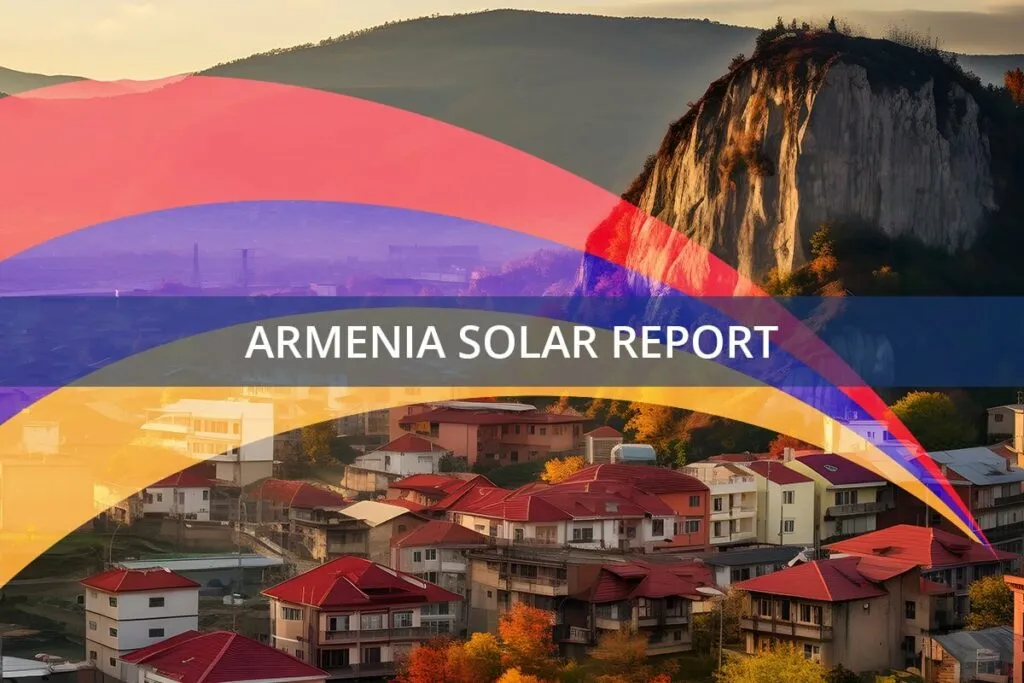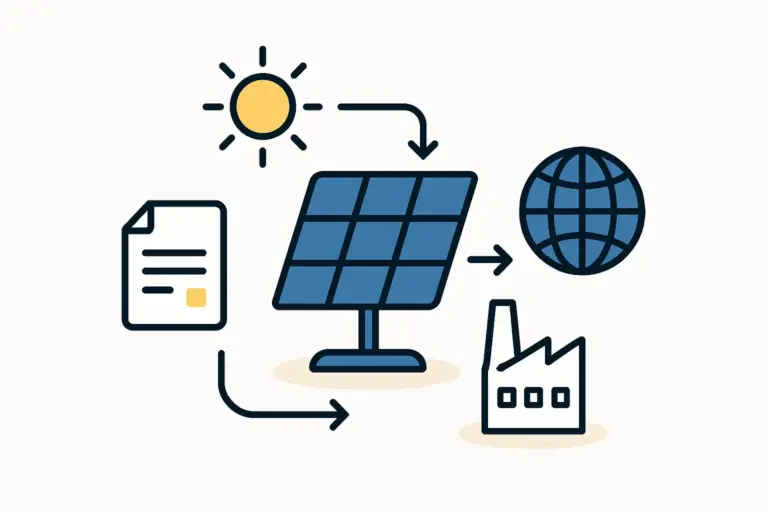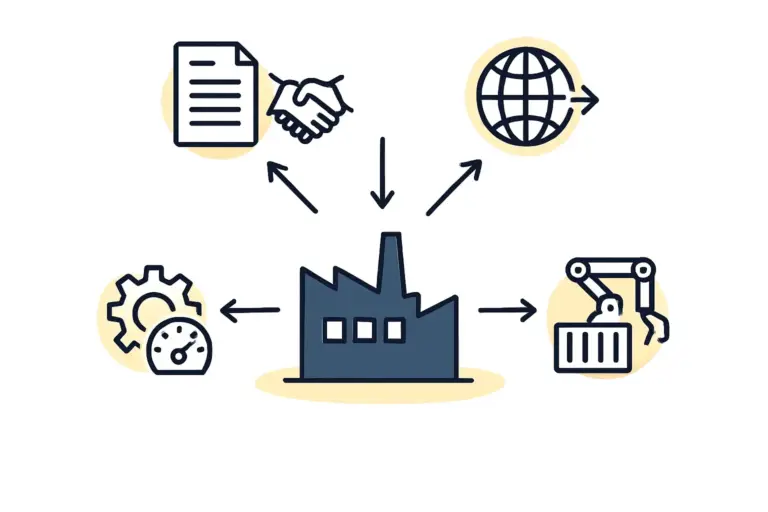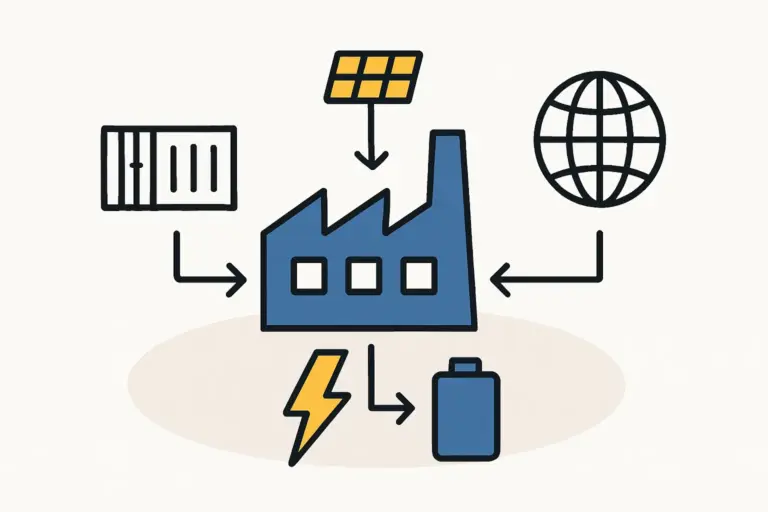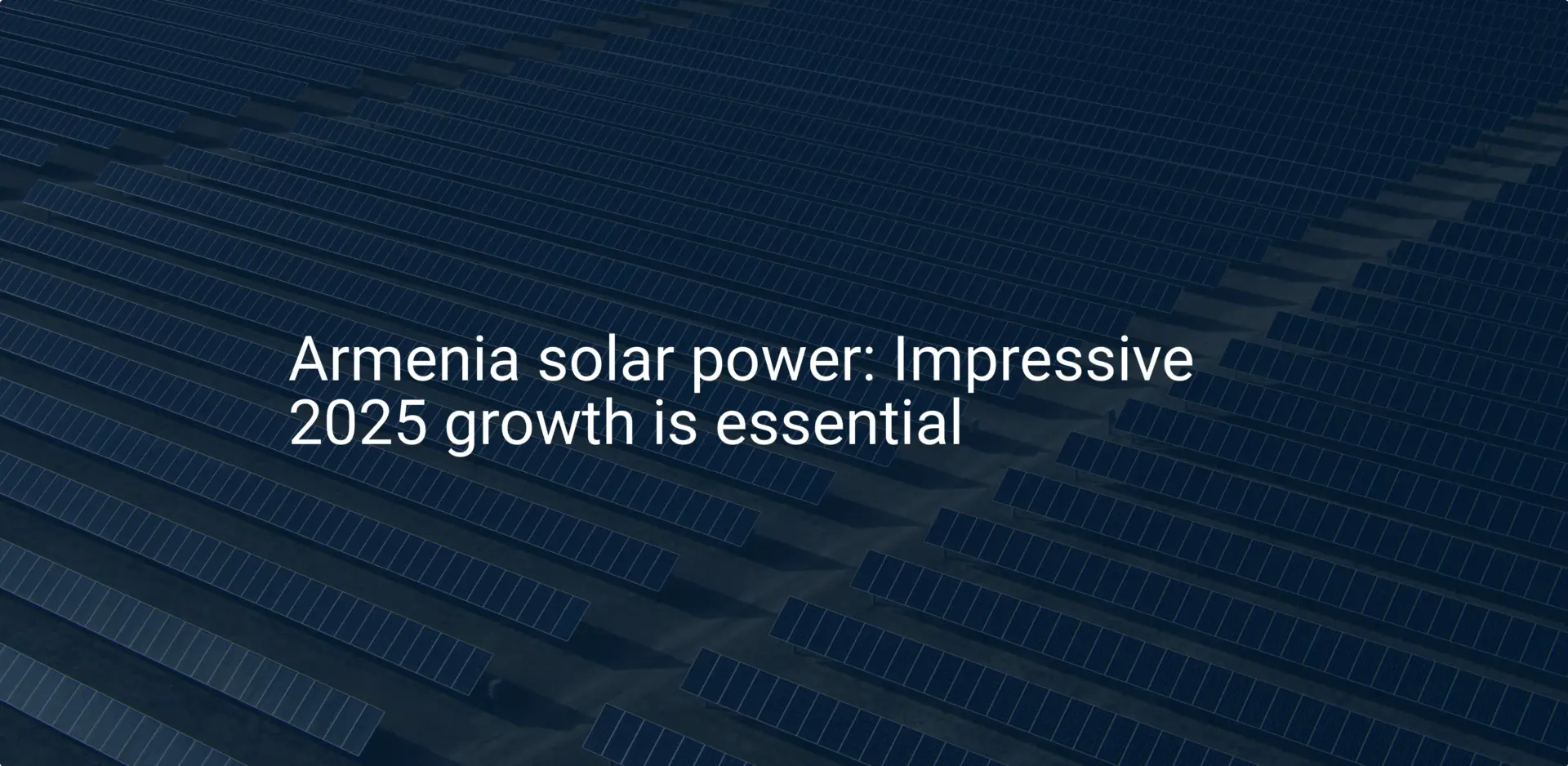It’s no secret that Armenia is increasingly harnessing its significant solar potential. With an average solar irradiation of 1,720 kWh/m² annually—a figure that far exceeds the European average—the country’s burgeoning solar energy sector makes a compelling case for local solar panel manufacturing.
Supported by strong government initiatives, the demand for locally produced modules is set to grow as Armenia aims to significantly increase its solar PV capacity by 2030.
For entrepreneurs and investors looking to enter this promising market, understanding the regulatory landscape is paramount. While Armenia may not have laws written exclusively for solar panel manufacturing, a solid framework of general industrial, construction, environmental, and business regulations governs the setup and operation of these facilities.
Drawing on insights from trusted sources like the U.S. Department of Commerce’s International Trade Administration and PVknowhow.com’s market analysis, this guide offers a comprehensive overview of the permits, licenses, and compliance standards you’ll need to navigate.
Table of Contents
Core Regulatory Bodies
To navigate Armenia’s regulatory environment successfully, you’ll need to interact with several key governmental bodies. Understanding their distinct roles is the first step in your compliance journey.
- Ministry of Territorial Administration and Infrastructure: This ministry is central to Armenia’s energy policy. While its day-to-day focus might lean toward energy generation and infrastructure projects, its policies ultimately shape the broader context for all renewable energy investments, including manufacturing.
- Ministry of Economy: Responsible for economic development, investment promotion, and business registration, this ministry is a key point of contact for establishing a legal entity and, critically, for understanding potential investment incentives.
- Ministry of Environment: This is a crucial ministry for any manufacturing operation. It oversees environmental impact assessments, emissions permits, and all regulations concerning waste management and hazardous materials.
- Public Services Regulatory Commission (PSRC): The PSRC plays a vital role in the energy sector by licensing energy generation and setting tariffs. While it doesn’t directly regulate manufacturing, its influence on the overall solar market is significant, so it’s wise to monitor its decisions.
- Local Municipalities: On a local level, these government bodies are responsible for issuing construction permits, ensuring adherence to zoning laws, and granting other operational approvals. Their role should not be overlooked.
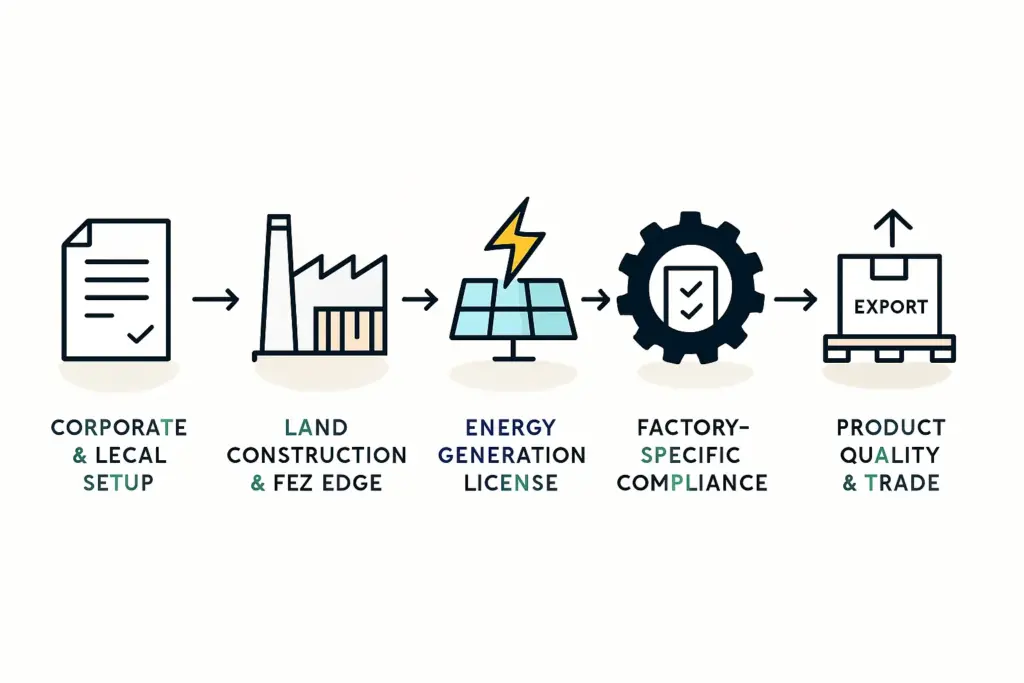 Solar Panel Manufacturing Plant in Armenia: A Comprehensive Guide to Permits and Compliance” class=”wp-image-34041″ srcset=”https://www.pvknowhow.com/wp-content/uploads/2025/06/Armenias-Regulatory-Framework_-Permits-and-Compliance-for-Solar-Panel-Manufacturing-1-1024×683.webp 1024w, https://www.pvknowhow.com/wp-content/uploads/2025/06/Armenias-Regulatory-Framework_-Permits-and-Compliance-for-Solar-Panel-Manufacturing-1-500×333.webp 500w, https://www.pvknowhow.com/wp-content/uploads/2025/06/Armenias-Regulatory-Framework_-Permits-and-Compliance-for-Solar-Panel-Manufacturing-1-768×512.webp 768w, https://www.pvknowhow.com/wp-content/uploads/2025/06/Armenias-Regulatory-Framework_-Permits-and-Compliance-for-Solar-Panel-Manufacturing-1-600×400.webp 600w, https://www.pvknowhow.com/wp-content/uploads/2025/06/Armenias-Regulatory-Framework_-Permits-and-Compliance-for-Solar-Panel-Manufacturing-1.webp 1536w” sizes=”auto, (max-width: 1024px) 100vw, 1024px” />
Solar Panel Manufacturing Plant in Armenia: A Comprehensive Guide to Permits and Compliance” class=”wp-image-34041″ srcset=”https://www.pvknowhow.com/wp-content/uploads/2025/06/Armenias-Regulatory-Framework_-Permits-and-Compliance-for-Solar-Panel-Manufacturing-1-1024×683.webp 1024w, https://www.pvknowhow.com/wp-content/uploads/2025/06/Armenias-Regulatory-Framework_-Permits-and-Compliance-for-Solar-Panel-Manufacturing-1-500×333.webp 500w, https://www.pvknowhow.com/wp-content/uploads/2025/06/Armenias-Regulatory-Framework_-Permits-and-Compliance-for-Solar-Panel-Manufacturing-1-768×512.webp 768w, https://www.pvknowhow.com/wp-content/uploads/2025/06/Armenias-Regulatory-Framework_-Permits-and-Compliance-for-Solar-Panel-Manufacturing-1-600×400.webp 600w, https://www.pvknowhow.com/wp-content/uploads/2025/06/Armenias-Regulatory-Framework_-Permits-and-Compliance-for-Solar-Panel-Manufacturing-1.webp 1536w” sizes=”auto, (max-width: 1024px) 100vw, 1024px” />Setting Up Your Manufacturing Business
Before you can apply for specialized permits, your manufacturing venture must be legally established in Armenia.
- Legal Entity Registration: The process involves choosing a legal structure, such as an LLC or a Joint Stock Company, preparing the necessary incorporation documents, and registering with the State Register of Legal Entities. An experienced local law firm can prove invaluable in streamlining this process, especially for international businesses.
- General Business Licenses: Depending on the specifics of your planned activities, you may need certain general business licenses.
- Tax Registration and Obligations: Registering with the State Revenue Committee is mandatory. A clear understanding of Armenia’s corporate tax rates, VAT, and other applicable taxes is crucial for sound financial planning from day one.
Securing a Location and Construction Permits
The physical establishment of your factory involves several layers of approval.
- Land Use Authorizations and Zoning Laws: First, the property you select must be zoned for industrial use. This might involve acquiring or leasing land and then ensuring it complies with local master plans.
- Building Permits and Construction Codes: A construction permit is a critical step, involving the submission of detailed project plans to municipal authorities and ensuring your plans comply with national building codes and safety standards. It’s wise to monitor any recent updates to construction licensing procedures.
- Special Considerations for Industrial or Free Economic Zones (FEZs): Armenia has several Free Economic Zones, like the ‘Alliance’ FEZ where LA Solar Factory operates. Locating your plant in an FEZ can offer attractive benefits, such as tax exemptions and streamlined customs procedures, making these zones worth considering.
Environmental Permits and Compliance for Manufacturing
Any industrial process has environmental implications, and in Armenia, adherence to regulations is non-negotiable.
- Environmental Impact Assessment (EIA): An EIA is almost always required for a project of this scale. This comprehensive study assesses potential environmental effects and outlines mitigation measures for the Ministry of Environment to review and approve.
- Permits for Air and Water Emissions: Since manufacturing processes can generate air pollutants or wastewater, you’ll need permits that stipulate allowable emission levels and the necessary treatment requirements.
- Regulations for Solid and Hazardous Waste Management: Solar panel production involves materials like silicon dust, chemicals, broken cells, and soldering materials that may be classified as hazardous. A robust waste management plan for collection, storage, transportation, and disposal or recycling is essential and must comply with national regulations.
- Chemical Storage and Handling Regulations: Safe storage and handling of chemicals used in manufacturing, like cleaning agents and solvents, are mandated by law to prevent environmental contamination and ensure worker safety.
- End-of-Life Panel Considerations: While not an upfront permit, developing a plan for future panel recycling and end-of-life management demonstrates responsible manufacturing and foresight. This is becoming an increasingly important factor in the industry.
Operational Licenses and Compliance
Once the facility is built, maintaining ongoing operational compliance is essential for long-term success.
- Specific Industrial Operation Licenses: Beyond a general business license, you might need specific licenses related to industrial operations or the handling of certain equipment under general industrial safety laws.
- Occupational Health and Safety (OHS) Standards: Armenia has labor laws and OHS regulations designed to protect workers. This means providing a safe working environment, proper safety training, personal protective equipment, and adhering to all machinery safety standards.
- Fire Safety Regulations: Manufacturing facilities must comply with strict fire safety codes. This includes installing fire detection and suppression systems, maintaining clear evacuation routes, and undergoing regular inspections.
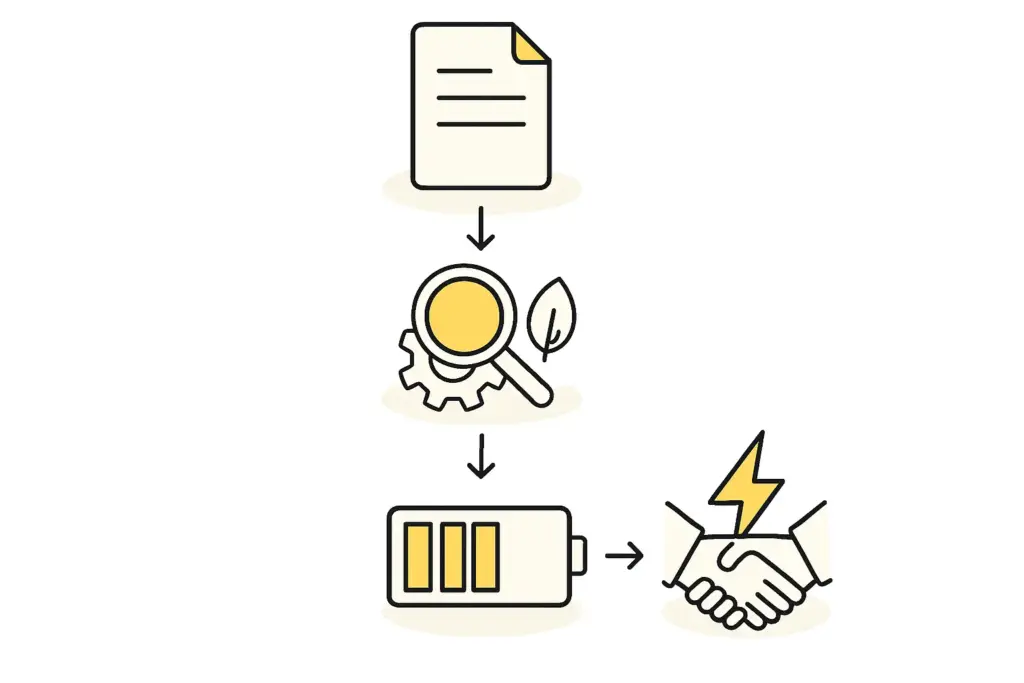
Product Standards, Quality Control, and Certification
The quality and safety of your solar panels will ultimately determine their acceptance in both domestic and international markets.
- Relevant International Standards (IEC, ISO): While Armenia develops its own national standards, adherence to widely recognized international benchmarks is highly recommended, especially if you plan to export. Key standards include IEC 61215 for design qualification and IEC 61730 for safety. An ISO 9001 certification for quality management is also highly valuable.
- Armenian National Standards: It’s important to investigate if any specific Armenian national standards (AZSTAND) apply to PV modules or related electrical equipment.
- Testing and Certification for Domestic Sales: Any panels you sell in Armenia will likely need to demonstrate compliance with national safety and quality benchmarks.
- Requirements for Export: If you plan to export, your panels must meet the certification requirements of your target markets, such as a CE marking for the European Economic Area.
Import and Export Procedures
Your manufacturing will rely on imported machinery and raw materials, and you’ll likely target export markets.
- Customs Regulations for Importing Machinery and Raw Materials: Understanding Armenian customs codes, goods declaration procedures, and applicable tariffs is crucial. Again, FEZs might offer exemptions or simplified procedures here.
- Customs Duties, VAT, and Potential Exemptions: It’s important to investigate potential exemptions on customs duties or VAT for imported capital goods or raw materials, particularly if your project is linked to renewable energy goals or investment incentives.
- Procedures for Exporting Finished Solar Panels: You’ll need to familiarize yourself with export documentation, customs clearance processes in Armenia, and any trade agreements that might benefit your bottom line.
Labor and Employment
Your workforce is a vital asset, and compliance with Armenian labor law is mandatory.
- Key Aspects of Armenian Labor Law: This covers everything from employment contracts and working hours to wages, leave entitlements, and termination procedures.
- Work Permits for Foreign Specialists: If you plan to bring in foreign experts, you must understand the process and requirements for obtaining the necessary work permits.
Investment Incentives and Support Mechanisms
The Armenian government is keen to attract investment, particularly in strategic sectors like renewable energy.
- Government Programs Supporting Manufacturing or Renewable Energy: Monitor specific programs from the Ministry of Economy or other state agencies that aim to boost local manufacturing or renewable energy development.
- Tax Incentives or Holidays: Certain investments, especially those in FEZs or designated priority sectors, may qualify for tax holidays, like profit tax or VAT exemptions, or reduced tax rates.
- Support from Organizations like Enterprise Armenia or ANIF: The Armenian National Interests Fund (ANIF) and similar organizations often promote investment and can provide valuable support or guidance.
- Financing Opportunities: Financing opportunities should also be explored. Entities like the European Bank for Reconstruction and Development (EBRD) have actively supported solar projects and manufacturing in Armenia. Local banks may also offer financing for industrial projects.
Navigating the Process: Key Challenges and Recommendations
Establishing a solar panel manufacturing facility in Armenia is a major undertaking that requires careful planning and execution.
- Potential Bureaucratic Hurdles: As in many emerging markets, navigating administrative processes can be complex. Patience and persistence aren’t just helpful—they’re essential.
- Importance of Local Legal Counsel and Consultancy: Engaging experienced local legal and business consultants who understand the nuances of Armenian law and administrative procedures is strongly recommended. They can prove invaluable for registrations, permit applications, and ensuring ongoing compliance.
- Staying Updated on Regulatory Changes: The legal and regulatory landscape evolves. Maintaining connections with industry associations, relevant ministries, and your legal advisors will help you stay informed of any changes that could affect your operations.
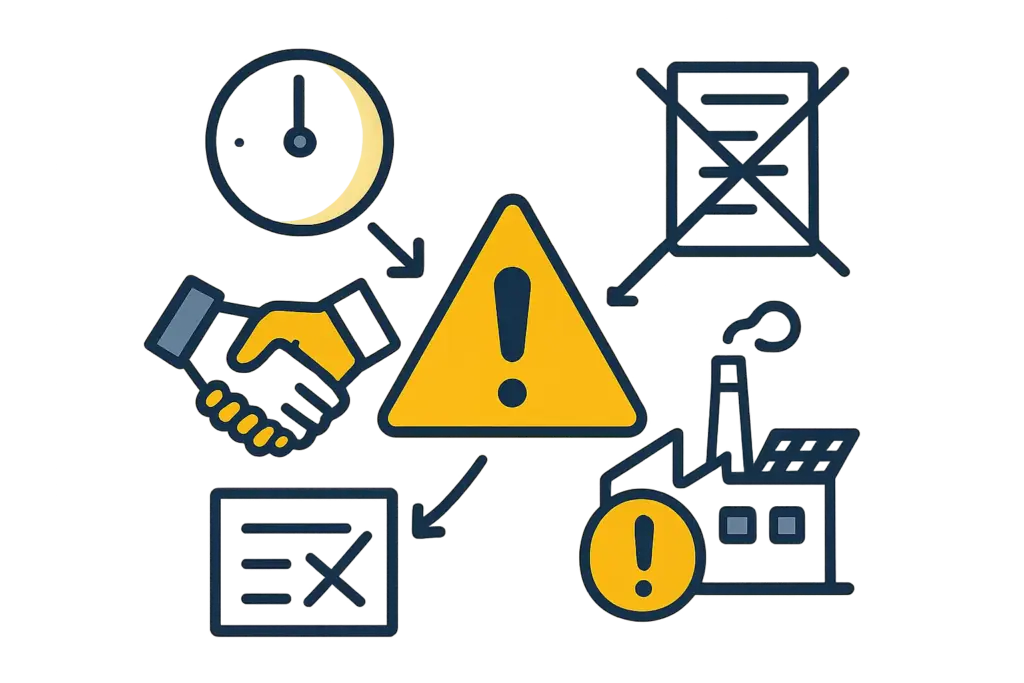
Conclusion
Armenia’s clear commitment to expanding its solar energy capacity, combined with its strategic location and potential for investment incentives, makes it an attractive destination for solar panel manufacturing. While the regulatory path requires navigating a landscape of general industrial, environmental, and business laws rather than a single ‘solar manufacturing act,’ the framework is in place to support such ventures.
Thorough due diligence, a clear understanding of the permitting requirements we’ve outlined, and proactive engagement with local experts are the keys to a successful market entry. By focusing on quality, compliance, and leveraging Armenia’s growing renewable energy ambitions, investors can establish thriving operations that contribute both to their business goals and to Armenia’s sustainable future.
Want to learn more or need expert help? Start with our free e-course for essential insights, or explore our services for dedicated support. If you’re ready to dive deeper, our Premium Business Plan E-Course offers the personalized guidance to get your venture off the ground. Let’s make your solar journey smooth and successful.
Frequently Asked Questions (FAQs)
Q1: Are there specific laws in Armenia just for solar panel manufacturing?
A: No, not at the moment. Establishing and operating such a facility falls under a collection of general laws that govern business registration, construction, industrial operations, environmental protection, labor, and taxation.
Q2: What is the most critical environmental permit needed for a solar panel factory in Armenia?
A: An Environmental Impact Assessment (EIA) approval from the Ministry of Environment is one of the most critical environmental hurdles. Additionally, permits for air and water emissions and a solid plan for hazardous waste management are essential.
Q3: Do solar panels manufactured in Armenia need specific certifications to be sold locally?
A: It’s advisable to check for any specific Armenian national standards for PV modules. However, compliance with internationally recognized standards like IEC 61215 and IEC 61730 is highly recommended and often expected as a baseline for quality and safety, even for the domestic market.
Q4: Are there tax benefits for setting up a solar panel factory in Armenia?
A: Yes, potential tax benefits are available. These can include incentives for investments in Free Economic Zones, specific government programs supporting manufacturing or renewables, or general investment promotion schemes. It’s crucial to consult with the Ministry of Economy to determine what you might qualify for.
Q5: Which government body is the primary contact for energy-related investments?
A: For broad energy policy, contact the Ministry of Territorial Administration and Infrastructure. For investment promotion and business registration, work with the Ministry of Economy. For energy market regulation, the Public Services Regulatory Commission (PSRC) is the main authority.
Q6: How long does it typically take to get all permits for a manufacturing facility?
A: The timeline can vary significantly depending on your project’s complexity, the completeness of your applications, and administrative processing times. Securing the land, obtaining construction permits, and completing the EIA process are often the most time-consuming stages. Engaging local experts can help streamline the process.

